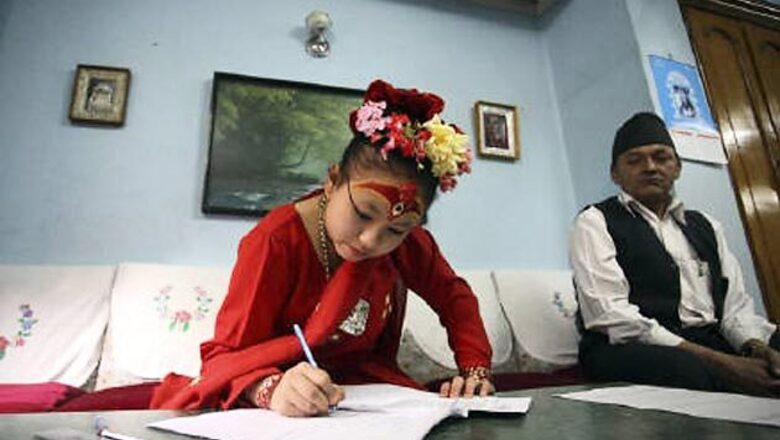
views
Patan, (Nepal): Even a "living goddess" is sometimes faced with tough decisions. Chanira Bajracharya, 15, has been the Kumari or "living goddess" of Patan, an ancient town south of Kathmandu, for nine years, blessing devotees at the temple and riding in decorated chariots 18 times a year during Hindu and Buddhist festivals.
Now, with her time as living goddess drawing to a close -- the young virgin deities retire on reaching puberty -- Bajracharya is contemplating a career in banking if she makes grades good enough to study commerce or accounting. Last week she became the first living goddess ever to take the school leaving certificate examination, which was administered to her in her temple, which is housed in her home.
"I want to study commerce or accounting and be engaged in the banking sector," she told Reuters in a rare interview, dressed in her ceremonial costumes, her eyes rimmed in black kohl and a third eye painted in the middle of her forehead.
Living goddesses are not allowed to mingle freely with outsiders, and lessons are also given privately in the temple. Tutors said the girl, addressed as Kumari, was intelligent and eager to learn. "She has a good memory and does not forget things," said Abha Awale, a teacher.
Former goddesses have gone on to work or got married after they retired, but not many have pursued an education, with cost possibly an issue: living goddesses receive 1,500 rupees (about $20) a month from the state, but only a nominal sum when they retire, and a good college can be pricey.
Young Buddhist girls from Kathmandu's Newar community are chosen as "living goddesses", considered to be incarnations of the Hindu goddess for power, Kali. They live austerely in temples in three cities in Kathmandu valley, with the main goddess, who blessed Nepali kings before the monarchy ended in 2008, living in a temple in Kathmandu.
Critics say the tradition violates the child's human rights and leaves her unprepared for life after retirement. Nepal's Supreme Court in 2008 ordered the government to ensure basic education and healthcare for the goddesses. But Bajracharya says she is happy.
"I don't feel sad (just) because I can't go out. I don't miss that. I have no friends but I can play with my two brothers. I feel a little bit proud when people come to visit me and respect me as a goddess," said Bajracharya, who speaks English haltingly and preferred to write her responses in the reporter's notebook. "I enjoy my Kumari life."




















Comments
0 comment